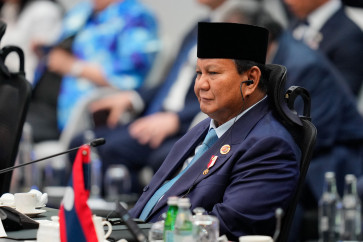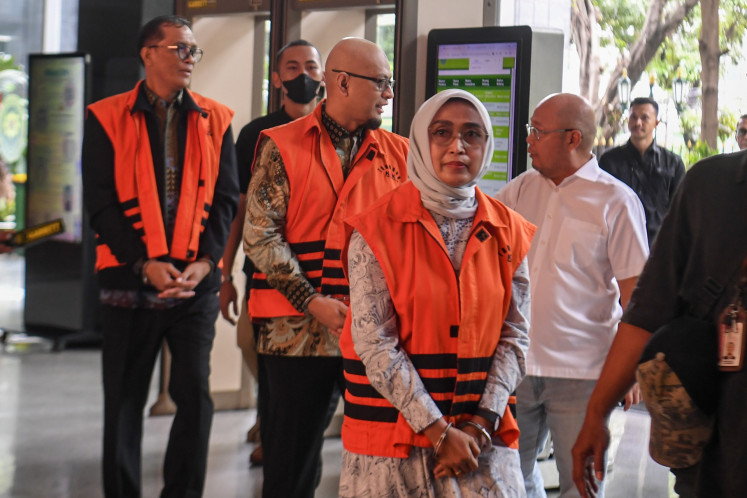Popular Reads
Top Results
Can't find what you're looking for?
View all search resultsPopular Reads
Top Results
Can't find what you're looking for?
View all search resultsA promise to domestic workers, after 10 years
An estimated 6
Change text size
Gift Premium Articles
to Anyone
A
n estimated 6.5 million Indonesians are currently working overseas. Indonesia has the second-largest population of migrant workers in countries across Southeast Asia after the Philippines.
Approximately 75 to 80 percent of them are domestic workers who have long endured isolation, underpayment, long working hours, forced labor, human trafficking and violence.
To improve the protection of its migrant workers, the government has taken some necessary efforts such as the domestic workers deployment moratorium, improving bilateral agreements, banning certain recruitment agencies and ratifying the 1990 UN Convention on the Protection of the Rights of All Migrant Workers and Members of Their Families.
On Feb. 12, Manpower and Transmigration Minister Muhaimin Iskandar stated that Indonesia would ratify the International Labor Convention No. 189 on decent work for domestic workers. The statement coincided with national domestic worker's day, commemorated by activists on Feb. 15. Thus, after the bill on domestic workers was first submitted to the House of Representatives, maids might see a realization of this decade-old promise.
The statement is a promising step that indicates the government is beginning to take the issue seriously in order to improve the protection of domestic workers both at home and overseas.
The International Labor Organization (ILO) Convention 189 is the first international apparatus that promotes decent working and living conditions for domestic workers. The convention was adopted by the ILO member states in June 2011 at the 100th International Labor Conference in Geneva.
The ILO has long been working to improve conditions for domestic workers, which was first discussed in 1936 when its annual conference adopted Convention No. 52 on Holidays with Pay.
According to the latest ILO estimates in 2010, at least 52.6 million people are employed as domestic workers in the world, mostly women. Globally, 83 percent domestic workers are female and about 41 percent of domestic workers are employed in Asia. Domestic workers make up 3.6 percent of paid work worldwide.
Yet in contrast to their economic contribution, domestic workers continue to experience discrimination and injustice abroad. Domestic work is among the lowest paid work in any labor market and still faces abusive practices regarding entitlements. For instance, 45 percent of domestic workers do not get a day off while only 50 percent are covered by minimum wages or equivalent sectoral/occupational rates. Ironically, 15.5 million are children engaged in domestic work.
In Indonesia, the National Labor Force Survey (Sakernas) recorded 2.6 million domestic workers in 2012, with over 75 percent of them female. Compared to 2008, the number increased by about 14.6 percent. In 2002, the ILO estimated about 72 percent of Indonesian migrant workers were paid less than Rp 300,000 (US$26) per month.
It also found that in Indonesia most domestic workers still endured long working hours of 14 to 18 hours per day without a single day off. The estimate also found 700,000 children in the domestic work sector in which 42 percent of them experienced gross violations such as physical, psychological and sexual abuse.
Domestic work is one of the world's oldest and most important occupations for millions. It is rooted in the global history of slavery, colonialism and other forms of servitude. Daycare work at home is vital for the economy outside the household to function. In the past two decades demand for care work has been on the rise everywhere.
The massive incorporation of women in the labor force, the aging of societies, the intensification of work and the frequent lack or inadequacy of policy measures to facilitate the reconciliation of family life and work underpin this trend.
Today, domestic workers make up a large portion of the workforce, especially in developing countries, and their number has been increasing ' even in the industrialized world.
They have contributed to a sustained labor force through subsistence economic work in the households, which in turn allows a country's economic growth; and citizens can work either in public or private sectors. They also contribute to more women in the world of work.
The economic growth of major destination countries for Indonesian migrant workers such as Malaysia, Singapore, Hong Kong and the Middle East cannot be separated from their contribution. For Indonesia, remittances sent by migrant workers to families are significant to family income. The National Migrant Protection Agency has reported that migrant workers remitted $7.4 billion or Rp 83 trillion.
As a significant country for both migrant and home domestic workers, ratification of the ILO Convention 189 becomes relevant for Indonesia for several reasons.
First, the ratification will be the legal basis to provide protection and normative rights of domestic workers in Indonesia. It would be ironic when the government and public demand the protection of Indonesian migrant workers while the typical problems are also encountered by domestic workers in their own country.
Second, ratifying ILO Convention 189 means Indonesia will be in a stronger position to improve the rights of its domestic workers overseas. Ratification would break the vicious cycle of poor migrant workers' protection.
Third, the ratification will prove Indonesia's consistency on the importance of protection of domestic workers as committed by its president at the ILO's 100th Labor Conference. In his speech, President Susilo Bambang Yudhoyono stated, '[...] those domestic workers who work within their own countries must also be given the same protection. Thus, this Convention will help us formulate effective national legislation and regulations for this purpose.'
Lastly, Minister Muhaimin's plan to ratify the convention this year will be crucial for the promotion of decent work for and protection of 2.6 million domestic workers in the country and 5.2 million domestic workers overseas. The ratification commitment should also encourage the legislature to finally pass the bill on the protection of domestic workers before the elections this April.
Domestic workers' rights should not rely on the mere compassion of employers but must be guaranteed by the state, like other workers. Now, millions of domestic workers are waiting for the minister's promise to be realized.
______________
The writer is a capacity building specialist at the Jakarta office of the International Labor Organization. The above views are personal.










